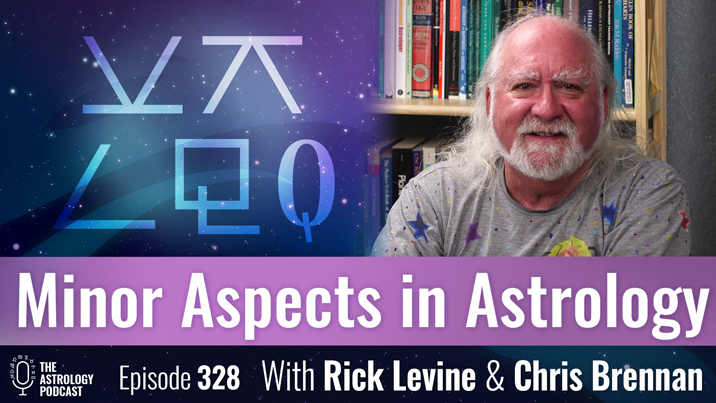
In episode 328 astrologer Rick Levine joins the show to talk about minor aspects in astrology, and whether they should be regarded as “minor”.
Minor aspects are generally categorized as any aspects besides the five classical “major” aspects that were originally introduced in western astrology around the 1st century BCE, which are the conjunction, opposition, trine, square, and sextile.
The minor aspects include the semi-sextile, quincunx, semi-square, sesqui-square, quintile, bi-quintile, septile, novile, and others.
Several of the minor aspects used today were first introduced by the German astronomer and astrologer Johannes Kepler in the 17th century CE, although their adoption in the astrological community has been uneven, with some astrologers using them and others not.
During the course of the episode we discuss the history of minor aspects and some of the debates surrounding them, and then later look at some charts where Rick demonstrates how he uses minor aspects in practice.
For more info about Rick check out his YouTube channel:
https://www.youtube.com/RickLevine
This episode is available in both audio and video versions below.
Timestamps
Here are some timestamps for topics covered at different points in the episode:
00:00:00 Intro
00:00:44 Rick’s views on whether they are really “minor” aspects
00:02:15 Major aspects review
00:03:36 History of the aspects
00:04:30 Kepler’s aspects
00:07:45 The inconjunct
00:08:40 Importance of major aspects
00:09:14 Mathematical harmonics
00:15:28 Minor aspects diagrams
00:18:28 Importance of the quintile
00:21:37 The septile
00:21:54 The quindecile
00:23:52 Kepler
00:30:38 The zodiac
00:34:44 Harmonics
00:43:47 Sign-based aspects
00:45:37 Aspects as divisions of a circle
00:52:09 Orbs
01:09:35 William Lilly quote about aspects
01:12:35 Kepler’s justification for the minor aspects
01:19:13 Synodic cycles
01:29:40 The quintile
01:36:16 The septile
01:39:06 More on harmonics
01:40:40 Yod
01:43:44 Kite
01:45:50 Quincunx yod
01:50:20 Modern string theory
01:51:14 Minor aspects and outer planets
01:52:13 Why do we need minor aspects?
01:53:21 Natal interpretation vs. mundane
01:58:40 Quincunx and aversions
02:00:31 Optics
02:02:17 More on yods
02:06:46 Difference between quintiles and septiles
02:12:32 Ram Dass’ natal chart
02:22:29 How Rick uses minor aspects in horoscopes
02:23:05 Harmonic convergence 2012
02:23:50 When Rick started using minor aspects
02:25:39 Rudhyar’s take on minor aspects
02:28:11 David Bowie’s natal chart
02:31:05 Rediscovery of whole sign houses
02:36:12 More on David Bowie
02:42:49 Michael Jackson’s natal chart
02:45:32 Emily Dickinson’s natal chart
02:49:40 Bob Dylan’s natal chart
02:57:51 Marilyn Monroe’s natal chart
03:01:20 Mozart’s natal chart
03:03:43 Princess Diana’s natal chart
03:09:59 Summary of the chart examples
03:18:02 Resources about minor aspects
03:21:50 Concluding remarks
Watch the Video Version of This Episode
Watch the video version of this episode on minor aspects:
–
Transcript
A full transcript of this episode is available: Episode 328 transcript
Listen to the Audio Version of This Episode
You can either play the audio version of this episode of the podcast directly from the website or download it as an MP3 to your device by using the buttons below:
Podcast: Play in new window | Download (Duration: 3:25:32 — 188.5MB)
